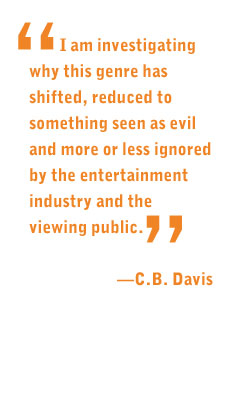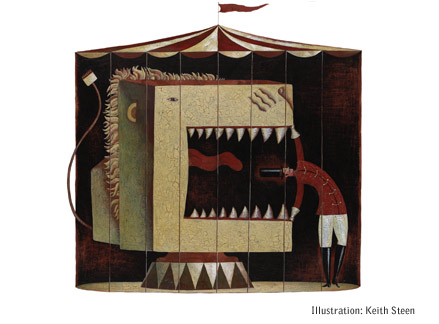


Darwin on Stage
by Lindsey Scott


C.B. Davis entered college intending to study biology — specifically, botany — but eventually changed his major to drama. Still, a life scientist’s way of looking at the world never really left him.
Davis, now a professor of drama at the University of Georgia, has transplanted biological theory into what he calls a “stubborn search” for reasons why performance genres wax and wane.
“I was studying genres that have become either endangered or extinct,” he said, “and the more I used those two words, the more I realized the similarities to biology. This led me to ‘cultural evolution theory,’ and it turns out I’m a Darwinian.”
Davis has applied his theory to the two once-popular performance genres of ventriloquism and “wild” animal performances, both of which have acquired negative connotations over the past century.
Ventriloquism has been reduced to the idea of an evil dummy coming to life, while People for the Ethical Treatment of Animals and other organizations have tarnished the reputations of animal trainers — although most trainers respect and treat their animals as they would their own children, according to Davis. In the course of his research, Davis learned of an animal trainer who would even have pre- and post- performance meetings with each animal.
He believes that images and ideas, just like genetic traits in plants and animals, survive through natural selection. Certain concepts are passed on for generations while others fade away completely over time. “It’s Darwin’s descent with modification by natural selection, or generically, evolution,” he said.

For example, ventriloquism in the early 19th century was a full-blown dramatic production. The artist would portray multiple characters and do “quick changes” while voicing the characters from off-stage, Davis said.
“It was an elaborate art, not just some guy talking out of the side of his mouth and waving a puppet around. I am investigating why this genre has shifted, reduced to something seen as evil and more or less ignored by the entertainment industry and the viewing public.”
Because their survival is determined by “selection pressures” — power struggles in political, economic and other realms — ideas about popular culture are constantly “fighting” for a spot in our memories, Davis said, and these ideas must adapt accordingly in order to stay relevant.
“The circus changed a lot when they stopped doing tent shows, while ventriloquism changed with the introduction of TV and the variety show,” he said. “Forms of these genres still exist, but they’re not what they were in the past. And as a result, they’re not as popular.
Pubic opinion, which can be swayed by press coverage, a book, or a movie, for example, also influences performance presentation, content and perception.
“Jack London’s book about evil animal trainers led to their exclusion from many circuses, and ventriloquist performances declined precisely when movies addressing the issue of the ‘split self’ created the now-common storyline of a ventriloquist’s dummy coming to life for a killing spree,” Davis said. The split-self genre made people afraid not so much of the dummy per se, but the ventriloquist’s possible use of the dummy to expose an evil side of his or her own personality.
There are numerous ways, potentially, to explain such Darwinian shifts in popular culture, and Davis — a self-titled “cultural performance historian” — is constantly “re-educating” himself in the methodology of performance analysis so as to include as many of them as possible in his cultural evolution theory.
“This is a really refreshing approach to history,” he said, “particularly as it applies to art, drama and theatre, because these things have never been studied from this angle before.”
For more information, contact C.B. Davis at cbdavis@uga.edu.
For comments or for information please e-mail: rcomm@uga.edu
To contact the webmaster please email: ovprweb@uga.edu
![]()